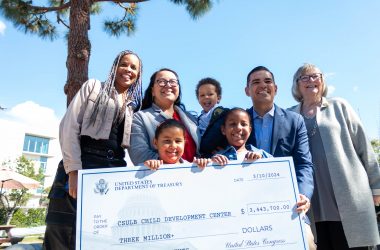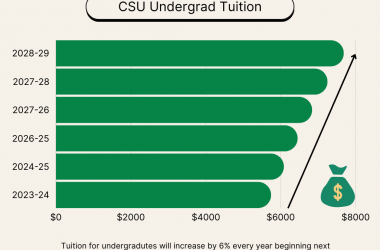The down economy, cuts to the university’s budget and fee increases have affected students on many levels. Job-seeking international students have not been immune.
Last summer, the state reduced the 2009-10 California State University budget by $571 million. Cal State Long Beach’s share of the cut was $44 million. Faculty and staff furloughs were implemented, about 1,000 classes were canceled, and tuition jumped by 30 percent from the 2008-09 price. Nonresident student fees also increased.
“When you have an economic situation where money is really tight, you’re going to see a reduction in opportunities for everyone,” said Inemesit Williams, study abroad advisor for the Center for International Education (CIE). “On top of that, when at the same time you have an increase in fees, students are going to scramble to find ways to cover these new costs.”
Last fall, there were 1,236 international students attending CSULB. That is about 3.5 percent of the nearly 35,000-student population. They come from more than 40 countries, with more than half from East or Southeast Asia.
Of these, 673 are pursuing a bachelor’s degree, 464 a master’s degree, two are working on a doctorate, six are seeking credentials and 88 are exchange students.
International students have either an F-1 student visa or a J-1 Exchange Visitor visa. Under U.S. law, these visas allow them to work on or off campus in a field related to their studies for a set time during school and after graduation.
Those who aspire to work for several years need a company to sponsor their application for an H-1B Temporary Worker visa. As the U.S. Department of Labor defines it: “The H-1B program allows an employer to temporarily employ a foreign worker in the U.S. on a nonimmigrant basis in a specialty occupation or as a fashion model of distinguished merit and ability.”
The spike in unemployment over the past year and a half in Southern California has increased the stakes for international students who want to land a long-term job. The seasonally adjusted unemployment rate for Los Angeles County was 12.4 percent in March, up from 7.9 percent in August 2008.
The Career Development Center on campus has hosted workshops targeting international students. These include seminars on finding an internship and writing an American-style résumé. Counselor Wayne Tokunaga stressed the importance of doing all one can to be marketable.
“If your experience is the exact same as a U.S. citizen’s, they don’t have to sponsor a U.S. citizen for H-1B,” Tokunaga said. “They’ll just go with a U.S. citizen because it’s easier.”
Competition for on-campus jobs is fierce. Because of budget cuts, departments throughout the university were told to limit student hires. In other instances, jobs that would normally be open to anyone were reclassified as work-study positions. Work-study is a form of financial aid available only to U.S. citizens and permanent residents, in which a set amount is paid in exchange for hours worked.
As Yuko Hirose, a senior journalism major, looked for a job last year, she came across the work-study reclassification problem. Last fall she worked at an on-campus restaurant. For her, graduating last December meant uncertainty. She had considered going to Europe to get a master’s degree.
“I was in love with America for a while, but realized with this economic crisis that a lot of things are happening that make me want to go out of the country,” she said. “To some extent, I feel that the American dream is not everything.”
Though she obtained an extension on her visa, which allowed her to stay until January 2011, she moved back to Japan to be closer to her family and have better job opportunities. She now works as a tour guide there and is studying to become a Japanese-English language interpreter. She also studies French and Italian on a regular basis with the hope of taking Japanese tourists to Europe.
“My career has just started and I am very excited,” she said. She added that she is making the best out of the language skills, experiences and knowledge she gained from living in the U.S.
CIE Senior Director Nathan Jensen said, “Most students are looking for just a part-time job to supplement their income a little bit to pay for expenses. Right now, they’re restricted to only on-campus employment. So when the campus has budget troubles and we cut back on the student assistants we’re hiring, that’s less jobs available for international students.”
With the current economy, for some local students, it is every man for himself. Joseph Dondero is a first-year film student, who saw his father, a police officer, get a pay cut due to the state budget problems.
“We should focus more on fixing our state’s budget and our country’s debt in general than giving people who come to this country just to study jobs,” Dondero said. “We should focus on giving people who live in this country jobs first.”
CIE advisor Williams noted the delicate balance the university needs to maintain when dealing with this issue. The major purpose of CSULB is to serve the local student population, but students from abroad are great revenue boosters. For these students, the job hunt has its ups and downs.
Annie Tran, a first-year pre-nursing major and local student, said that foreign students need to be able to deal with these circumstances.
“When international students take that big leap ¬— that big risk in coming to a different country to study — they should be able to cope with the difficulty in finding a job as well,” Tran said.
Yuying Lu has had a different experience. She came from Dalian, China in 2007 to study for a master’s degree in educational technology and graduated last May. Since then, she found a job with an LED display manufacturer and was sponsored for her H-1B visa. While pursuing her master’s, she worked as a graduate assistant and with the housing dining service.
“The economy is not good, but it doesn’t mean you cannot find a job at all,” Lu said. “There are still chances. There are still opportunities. You need to keep looking for it, just don’t give up. Don’t just focus on school and don’t just focus on the people that you know. Keep looking and build up your own network.”
Vaibhav Shetge of Mumbai, India also keeps a positive attitude. He began studying for his master’s in electrical engineering in 2008. He has been the production and technical director of K-Beach, the on-campus radio station, and recently started an internship with a company specializing in audiovisual gear. He advises new international students not to get embarrassed about what sort of job one gets while studying.
“In India, not all jobs are looked at with the same respect,” he said. “Sometimes it becomes a mental thing like: ‘I’m an engineer. What kind of a job am I doing?’ But it’s nothing like that. Every job has its own importance. Every job has its own challenges.”
Disclaimer: The Daily 49er is not responsible for Postings made on www.daily49er.wpengine.com. Persons commenting are solely responsible for Postings made on this website. Persons commenting agree to the Terms of Use of the website. If Postings do not abide by the Rules of Conduct or Posting Regulations as listed in the Postings Policy, the Daily 49er has all rights to delete Postings as it deems necessary. The Daily 49er strongly advises individuals to not abuse their First Amendment rights, and to avoid language suggestive of hate speech. This site also encourages users to make Postings relevant to the article or other Postings.



